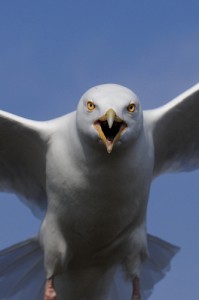Businesses are being urged to do their bit to help combat Bath’s urban gull problem.
Bath & North East Somerset Council has reaffirmed the measures it is taking to deal with the issue – including deterring the birds by making building smell as if they are on fire.
Businesses can help by only putting out waste at the correct times, says the council.
The problems caused by aggressive gulls are among the top complaints for those living in, and visiting, the city.
The council points out that it is people and businesses that can do most to stop the menace caused by these birds.
Cabinet Member for Neighbourhoods councillor David Dixon said: “The council is battling against the forces of nature as we combat the problem of urban gulls. But residents and visitors to the city must also be proactive in doing their best to stop their supply of food.
“Our message is very clear. Don’t feed or encourage gulls by dropping food or feeding them scraps. Dispose of your litter responsibly in litter bins or take the litter home with you. And use the food waste collection service where it is provided by the Council as part of your weekly waste collection. Those people who don’t receive this but have a Council provided gull proof sack should use that.
“Businesses must also play their part by putting their waste out at the correct time which will help. Our enforcement action against repeat offenders is starting to get the message across that anyone who puts out waste overnight is part of the problem.”
The Council is tackling the problem by the following measures:
- Last month, the number of gull proof re-usable rubbish sacks was extended to cover a further 850 homes. The bags were originally trialled on 1,000 homes last September and proved popular with 86% of residents wanting to continue to use them at the end of the trial;
- An egg replacement service for businesses has been introduced on several roofs within the centre. The gulls’ eggs are replaced with dummy eggs (plastic eggs part filled with sand that can be painted to look like the real thing) and in most cases, the gulls carry on incubating the dummy eggs;
- 55 solar compacting bins have been sited in Bath city centre which contain the waste to stop gulls accessing any food within the bin and have increased litter bin capacity by more than 600%;
- A new ‘fire gel’ is being trialled on a number of council buildings which produce a smell that gulls do not like and should they land upon it the gull thinks that the building is on fire and flies off – this helps further to prevent nesting;
- Operation Sunrise aims to raise awareness within the commercial premises community of what can happen to waste if it’s left out overnight. The council has already had to take legal action against several business premises that have continued to leave their waste out overnight;
- A regular regime of street washing takes place in the central area, the Bath BID rangers assist as they work very closely with the Council in helping to clean public and privately owned areas.
The council has also busted four popular gull myths:
Myth 1; The Council is responsible for dealing with gulls and wild birds;
- Wrong; Town halls have no responsibility at all, but recognising the nuisance they can cause, the Council tries to limit the impact.
Myth 2; There is such a thing as a ‘Bath Gull’;
- Wrong; Gulls come from a very wide catchment area and head as far afield as Spain and Northern Africa. They also feast on landfill sites as far as Oxford and Cambridge, before flying back to next in Bath. They are a national problem.
Myth 3; The number of gulls can be reduced by shooting them;
- Wrong; All birds, eggs and their nests are protected under the Wildlife and Countryside Act 1981. The Act does not allow action against birds for the prevention of damage to property or nuisance problems, like noise or smell.
Myth 4; Gull numbers are increasing all the time
- Wrong; The most recent survey suggests that the growth of the population continues to decrease for the 3rd successive year. Whilst Bath city centre has historically been the area where the population has been concentrated, there is evidence to suggest that the number of breeding pairs here is decreasing.
For more information about gulls, including a leaflet for developers and owners of premises to help prevent nesting opportunities for birds, visit the council website. Anyone with information about a specific building where there appears to be a significant gull problem, should contact the council on 01225 477551 or 01225 477563.



















